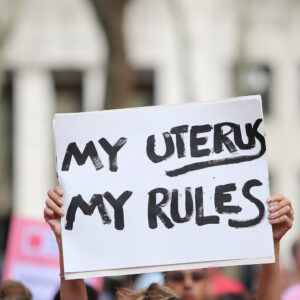Arizona’s Supreme Court judges just joined others in a line of states taking foolish measures to roll back abortion rights, reasserting an 1864 law banning the procedure outright. Meanwhile, groups working to put abortion rights on the ballot in the state have gathered half a million signatures, setting the stage for an overwhelming turnout at the November election.
Arizona’s Supreme Court has poured gasoline on a fire. They’ve also poked a bear and kicked a hornet’s nest. Those are just some of the metaphors I’ve heard since the ruling, and I’m not sure any of them entirely do the situation justice.
I lead IGNITE, an organization for Gen Z women’s political power. We were in Phoenix the night after the judges passed down their ruling. Suffice it to say, abortion was prominent in their conversation, reverberating as an aftershock from the political earthquake that had taken place earlier — another apt metaphor for what happened.
Legislators from both sides of the aisle criticized the ruling, and they are right to do so. The dormant law, dating back 48 years before Arizona became a state, bans abortion from the moment of conception and makes no exceptions for rape or incest. Doctors prosecuted under it could face imprisonment for up to five years. Slavery was still legal when the law was passed. It makes one’s hair stand on end.
But whatever metaphor you use to describe the situation in Arizona, there is cold, hard math about abortion rights and elections. It is indisputable, and it is stark, and it makes me more grateful than ever for democracy in America.
About one in eight voters say abortion is the most critical issue to them in the coming elections. Those numbers become even more prominent with key groups of women voters. More than one in four Black women voters (28 percent) and about one in five women who live in states where abortion is banned (19 percent) identify as “abortion voters.” There has also been a massive shift in the motivations of “abortion voters” since the Supreme Court overturned Roe v. Wade in the Dobbs decision in 2022. Before that, most “abortion voters” were anti-abortion. Now, most abortion voters say it should be legal in all or most cases.
Our research shows that 65 percent of Gen Z women place abortion as a top-five voter turnout issue. Gen Z and Millennials are now the largest voting bloc in the country. We won’t tolerate judges and politicians controlling our bodies. It’s a simple fact. And it’s backed by recent evidence.
States across America have voted overwhelmingly to defend abortion since the Dobbs ruling. Ohioans upheld abortion rights by 56 percent. Kansas rejected an anti-abortion amendment to its state constitution. Montanans rejected an anti-abortion referendum measure. Kentucky did the same. Wisconsin voters appointed a Supreme Court judge who was outspoken about protecting abortion. Last week, Florida became the latest state to pave the way for a November electoral showdown on the issue after Supreme Court judges banned abortion after six weeks. In March, Alabama voters went overwhelmingly for a state legislative candidate who placed reproductive rights at the center of her campaign, just a month after the state’s Supreme Court effectively outlawed in-vitro fertilization.
The Alabama candidate, Marilyn Lands, described Alabama as “ground zero” for the fight over abortion rights. She told reporters she had heard countless times from voters in her district that the court’s ruling hurt them and that they were worried for their children and grandchildren. Other families told the candidate they planned to leave the state after the court’s ruling. Her opponent did not talk about abortion on the campaign trail despite his side having held the seat for decades.
The beauty of American democracy is that it allows voters to have their say, no matter what dangerous agendas might be in play. In Arizona, the Supreme Court won a battle in the much larger and crucial war for women’s rights and freedoms. That’s hardly a metaphor, either. Regardless, we will win. You can be sure of it.


